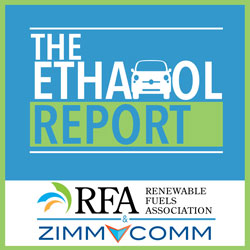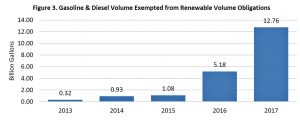 The Renewable Fuels Association (RFA) is marking the beginning of a new era. The Reverend of Renewables is climbing into the backseat of the ethanol organization and allowing Executive Vice President Geoff Cooper to drive. Cooper will assume the position of president and CEO in October 2018, while current President and CEO Bob Dinneen will transition into the role of RFA’s Senior Strategic Advisor.
The Renewable Fuels Association (RFA) is marking the beginning of a new era. The Reverend of Renewables is climbing into the backseat of the ethanol organization and allowing Executive Vice President Geoff Cooper to drive. Cooper will assume the position of president and CEO in October 2018, while current President and CEO Bob Dinneen will transition into the role of RFA’s Senior Strategic Advisor.
Dinneen has been with RFA for more than 30 years, including serving as the organization’s president and CEO since 2001. During his tenure, Dinneen led the industry and achieved a number of landmark legislative and regulatory victories for ethanol, including passage of the original Renewable Fuel Standard (RFS) in 2005 and significant expansion and extension of the RFS program in 2007. Dinneen also played a crucial role in the creation of the reformulated gasoline and oxygenated fuels requirements; securing the RVP waiver for E10; working with states to adopt bans on MTBE; and multiple extensions of the ethanol blender’s tax credit and secondary tariff on imported ethanol, among other important victories.
“For more than three decades, I have had the privilege of working for an industry whose mission inspires me, a Board of Directors that supports me, and an organization that exemplifies the highest degree of professionalism, creativity, and competence,” Dinneen stated. “I have borne witness to phenomenal growth, seen rural economies transformed and gotten to know and work side-by-side with the people who made this industry the success it is today. Every day I am thankful for our accomplishments and still enthusiastic to tackle the challenges ahead. Without a doubt, I have been truly blessed.”
“But 30 years is a long time and I believe now is the right time for new leadership, new ideas, and new energy at the helm of the Renewable Fuels Association. I am going to keep working at RFA in a different capacity but with the same goal; to assure RFA and the industry I care about so deeply continue to grow and realize their full potential,” Dinneen continued. “At the very least, I have great confidence that under Geoff’s leadership, the RFA will develop into an even more effective and authoritative voice for the U.S. ethanol industry, and that may be my greatest blessing.”
 The Renewable Fuels Association (RFA) has announced a change in leadership for the ethanol industry’s leading trade association. Executive Vice President Geoff Cooper will assume the position of president and CEO in October 2018, while current President and CEO Bob Dinneen will transition into the role of RFA’s Senior Strategic Advisor.
The Renewable Fuels Association (RFA) has announced a change in leadership for the ethanol industry’s leading trade association. Executive Vice President Geoff Cooper will assume the position of president and CEO in October 2018, while current President and CEO Bob Dinneen will transition into the role of RFA’s Senior Strategic Advisor.








